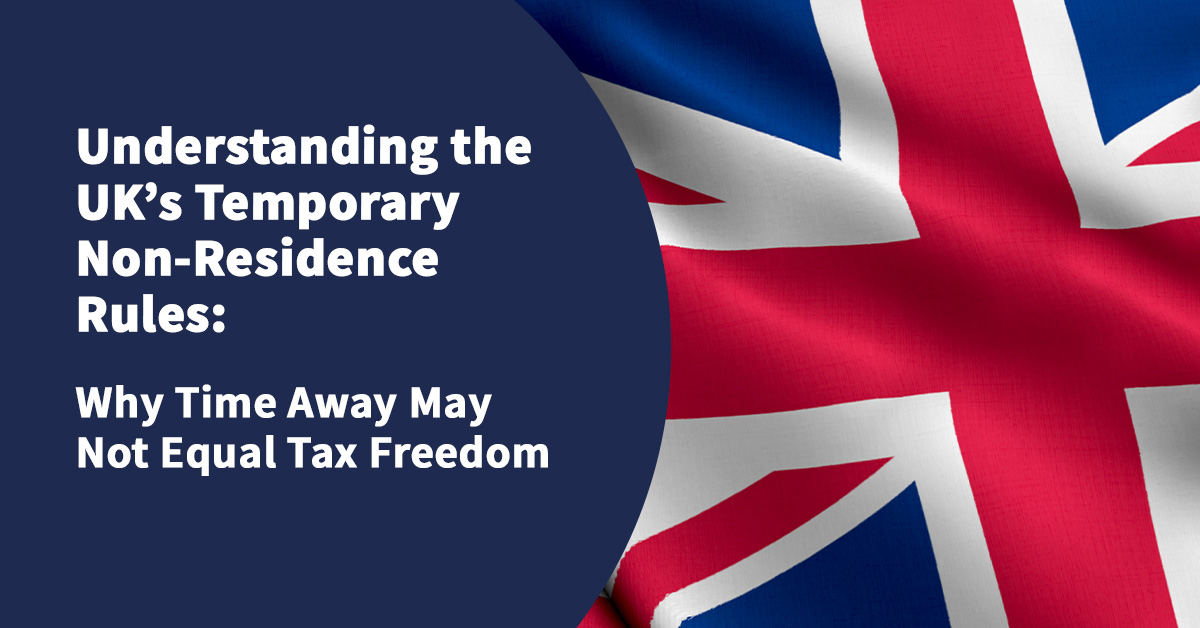TL;DR: If you return to the UK within five years of leaving, gains or withdrawals made abroad could still be taxed under the Temporary Non-Residence Rules — designed to prevent short-term moves purely for tax advantage.
For many UK expatriates, moving abroad comes with the hope of resetting their tax position — particularly around capital gains or pension withdrawals. However, the UK’s Temporary Non-Residence (TNR) Rules are designed to stop individuals from leaving the country to avoid tax, then returning shortly after. These rules can create unexpected tax liabilities years later, even if you have lived abroad and considered yourself “non-resident”.
Understanding how the TNR rules work is essential for anyone relocating, accessing pension funds, or selling investments while overseas. This guide explains what the rules mean in practice, which income types are caught, and how to plan effectively to avoid costly surprises.
What Are the Temporary Non-Residence Rules?
The Temporary Non-Residence Rules are part of the UK Income Tax Act 2007 and the Taxation of Chargeable Gains Act 1992.
In essence, they state that if you become non UK-resident, realise certain gains or income while abroad, and then return within a defined period, those transactions may still be subject to UK tax. As if you had never left.
The goal is to prevent short-term tax-driven migrations.
How Long Is “Temporary” Non-Residence?
The “4 of 7 / 5 Years” Rule
To fall within the UK’s Temporary Non-Residence (TNR) rules, two conditions generally need to be met:
- You were UK resident in at least four of the seven tax years before the year you left the UK.
- You were non-resident for five or fewer complete UK tax years before becoming UK resident again.
According to HMRC Helpsheet HS278 (Temporary non-residents and Capital Gains Tax, updated 2023):
“You’re treated as temporarily non-resident if you were resident in the UK for at least four of the seven tax years before the year you left the UK **and you return to the UK after a period of non-residence of five years or less.”
— HMRC HS278, Section ‘Temporary non-residents’
Here’s how this works in practice:
Example:
Suppose you leave the UK in September 2025. Looking back, in the seven tax years before you left (2018/19 to 2024/25), you were UK resident in four of those years(including any split years treated as UK-resident). You then return to the UK in 2030, meaning you have been non-resident for fewer than five complete tax years.
In this situation, you would likely be classed as temporarily non-resident. Any capital gains or certain income you realised while abroad. For example, from selling shares, cashing in an offshore bond, or taking a pension withdrawal could be taxable in the UK in the tax year you return, as if those gains had occurred in that year.
If instead you stayed abroad for more than five full UK tax years, or had not been UK resident for at least four of the seven years before departure, the TNR rules would not apply, and those gains would generally remain outside the UK tax net.
Why Confusion Often Arises
- Some sources incorrectly refer to a “five out of seven” test, but HMRC guidance confirms it is four out of seven years of UK residence before departure.
- The period of non-residence is measured in UK tax years, not calendar years, so leaving or returning mid-year can complicate the count.
- Split years (where you are resident for part of a year) can still count toward the “four out of seven” requirement if they include a period of UK residence.
- There are also nuances where remittance basis or split-year treatment applies, and these rules are evolving from 6 April 2025 as the UK moves toward a residence-based regime.
What Is Caught by the Rules?
The Temporary Non-Residence Rules apply to specific types of income and gains, including:
-
Capital Gains
If you dispose of assets while abroad such as shares, investment portfolios, or property (that is not your main residence) the gains may become taxable when you return to the UK within five years.
There are some exceptions, for example where the asset is located outside the UK and is not tied to a trade or business.
-
Pension Withdrawals
If you access a UK pension (for instance, through a flexible drawdown or lump-sum withdrawal) while non-resident, that withdrawal could become taxable in the UK upon your return.
This rule exists to prevent individuals from “cashing out” pensions overseas to avoid UK income tax, then returning home shortly afterwards.
-
Close Company Distributions and Loan Redemptions
If you are a director-shareholder of a private limited company and take distributions or repay loans to yourself while non-resident, these could also be re-taxed under the TNR rules.
-
Offshore Bond Gains
Gains from offshore bonds (onshore life assurance policies or capital redemption bonds) can also be caught if they are encashed or part-surrendered during a period of temporary non-residence.
TNR is largely irrelevant for UK property
Since 6 April 2015, Non-Resident Capital Gains Tax (NRCGT) applies to all UK residential property disposals, regardless of how long you’ve been non-resident.
This means that if you‘re non-resident and sell a UK house or flat, whether it’s a main home, buy-to-let, or second home you are already within scope of UK Capital Gains Tax.
So, even if you leave the UK, sell your second home while abroad, and never come back, HMRC still taxes that gain under NRCGT.
Therefore, the TNR rules don’t add anything new for these disposals — the gain is taxed anyway.
Example: When the Rules Bite
Sarah, a previously UK-resident investor, relocates to Dubai in July 2025 and sells some investments within a general investment account (GIA) in 2027, realising a £400,000 gain. She returns to the UK permanently in 2030.
Because she has only been non-resident for four complete tax years (2026/27, 2027/28, 2028/29, 2029/30), she is classed as temporarily non-resident.
That £400,000 gain becomes taxable in the UK in the year she returns.
If she had waited to return until after 6 April 2031, the gain would fall outside the TNR rules and remain exempt from UK capital gains tax.
Key Exceptions
Some gains and income are not caught by the rules, including:
– Gains on foreign assets that do not have a UK connection (depending on domicile and other factors).
– Income arising from overseas employment, if taxed abroad.
However, determining what qualifies for relief requires careful analysis, particularly where dual taxation agreements, split-year treatment, or remittance basis claims are involved.
Planning Opportunities and Pitfalls
-
Timing Is Everything
If you plan to sell UK assets or take significant pension withdrawals, it is essential to calculate your potential date of return carefully. Even a few months’ difference can determine whether gains are taxed or not.
-
Track Your Residency Status
Use the Statutory Residence Test (SRT) to confirm when you officially cease and resume UK residence. The TNR rules hinge on these precise definitions, not simply where you happen to live.
-
Consider Using Tax-Efficient Wrappers
Offshore bonds, trusts, and other compliant international structures can help defer or manage tax exposure, but must be set up properly to avoid triggering anti-avoidance rules.
-
Review Before Returning
Before moving back to the UK, review all disposals, withdrawals, and income received while abroad. You may be able to restructure or time transactions to avoid falling within the TNR window.
FAQs: The UK’s Temporary Non-Residence Rules Explained
You must be non-resident for more than five complete UK tax years to avoid the rules.
If you return to the UK within five full tax years, and were UK resident in at least four of the seven tax years before leaving, you may be classed as temporarily non-resident and could face UK tax on certain gains or income realised while abroad.
This test looks back at your UK tax residency in the seven tax years before you left.
If you were UK resident (including split years counted as resident) in four or more of those years, and then return within five full tax years, you fall within the TNR rules
The rules mainly target:
- Capital gains on assets owned before leaving the UK, such as shares
- Pension withdrawals taken while non-resident
- Distributions or loan repayments from closely held companies
These amounts may be taxed in the year of your return to the UK.
Usually not, unless there is a UK connection (for example, the asset was used in a UK trade or held through a UK company).
However, gains on UK assets, or those linked to your UK employment or business, can still be taxed even if realised while living abroad.
The five-year clock is measured in UK tax years, not calendar years.
For example, if you leave in September 2025, your first full tax year of non-residence starts on 6 April 2026. You would need to remain non-resident until 6 April 2031 to complete five full tax years outside the UK.
Withdrawals from a UK pension made during a period of temporary non-residence may become taxable in the UK when you return. Even if no UK tax was paid at the time of withdrawal, HMRC can reassess it once you resume residency.
Yes. The Statutory Residence Test (SRT) determines whether time spent in the UK makes you resident again. Even short visits can count if you exceed the permitted number of days, or if your ties to the UK (family, property, work) remain strong.
If you remain non-resident for more than five full tax years, any gains or income realised while abroad will generally stay outside the UK tax net — provided they are not linked to UK assets or activities.
- Plan the timing of your departure and return carefully.
- Keep accurate records of residency, travel days, and income.
- Avoid selling major UK assets or taking pension withdrawals within five tax years of leaving.
- Seek professional cross-border tax advice before making any large disposals or returning to the UK.
The Takeaway
The UK’s Temporary Non-Residence Rules can turn what looks like a smart tax decision into an expensive surprise.
If you are considering selling assets, drawing pension funds, or restructuring investments while abroad, ensure that your residency position and timing are clearly understood.
Tax efficiency should never rely on guesswork and with careful planning, you can avoid the pitfalls of temporary non-residence and preserve your hard-earned gains.
Benefit from comprehensive, integrated, and objective advice.
Let’s discuss your specific needs and how I can help you meet your objectives
Let’s start the conversation
Online enquiry form
Related posts
 Published On: November 10, 2025|5.3 min read|
Published On: November 10, 2025|5.3 min read|How to Choose the Right Financial Adviser Before Moving Abroad (UK Residents Planning to Relocate)
If you’re planning to relocate abroad, find out how a UK-qualified financial adviser can help you prepare. Learn about tax residency, Double Taxation Agreements (DTAs), the Statutory Residence Test (SRT), offshore accounts, and how to structure assets before you leave.
Read more
 Published On: November 7, 2025|6 min read|
Published On: November 7, 2025|6 min read|Should You Sell or Keep Your UK Property When Moving Abroad?
For many people leaving the UK, one of the biggest decisions isn’t what to pack, it’s what to do with the family home or investment property. Should you sell before you leave, or keep it and rent it out while you live abroad?
Read more
 Published On: November 5, 2025|4.8 min read|
Published On: November 5, 2025|4.8 min read|Digital Nomad? Yes. Tax Nomad? No.
Digital nomads can work anywhere, but tax rules still follow. Discover why you can’t be a “tax nomad” and how to plan your residency correctly.
Read more















